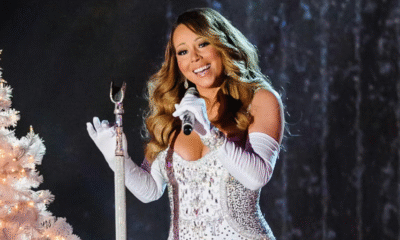Business
Why ‘Bidenomics’ is falling flat with voters on December 28, 2023 at 12:25 pm Business News | The Hill
President Biden’s attempt to sell Americans on his role in post-pandemic economic recovery has fallen flat, even as the U.S. economy defies the odds and expectations of experts.
Despite widespread fears at the beginning of the year that a recession was on the way, the U.S. economy is on track to finish 2023 with low unemployment, steady economic growth and significantly slower inflation.
These remarkable topline numbers, however, have done little to help Biden’s standing with voters or their views on the economy.
“You don’t expect sentiment and economic fundamentals to always track perfectly, but they are really, really off,” said Matt Darling, senior employment policy analyst at the Niskanen Center, a nonprofit think tank.
Biden’s approval rating has fallen to a record low of 34 percent, according to Monmouth University poll released last week, with nearly 70 percent of respondents disapproving of his handling of inflation. More than half of respondents disapproved of Biden’s record on jobs, even as he presides over a historically strong labor market.
The November unemployment rate of 3.7 percent is just 0.2 percentage points above its pre-pandemic level, which marked a five-decade-low in joblessness. The annual inflation rate also plunged last month to 3.1 percent from a high of 9.1 percent in June 2022, according to the Labor Department’s consumer price index (CPI).
U.S. gross domestic product (GDP) is on track to rise at nearly pre-pandemic levels, far faster than the minimal or even negative growth projected by scores of economists. And the economy posted these strong topline numbers in the face of rapid Federal Reserve rate hikes, which bank officials admitted could tank the economy into a recession.
Biden and his allies have kept the economy front and center in the president’s reelection campaign, which will likely end with a rematch against former President Trump, the frontrunner for the GOP nomination. Biden currently trails Trump by 2 percentage points, according to The Hill/Decision Desk HQ poll tracker.
The Biden administration and campaign have tried to reverse the trend by touting the benefits of “Bidenomics” — a loosely defined phrase focused on the president’s enactment of trillions of dollars in stimulus and economic relief, and how those packages have benefited the economy.
“When President Biden took office, he inherited an economy from Donald Trump that was rigged for the ultra-rich and left in shambles. But thanks to President Biden’s leadership, the U.S. economy has consistently defied expectations, with millions of jobs created, inflation at its lowest level in more than two years, and costs coming down for the American people,” said campaign spokesman Kevin Munoz last week after another strong inflation report.
They have also largely waived off criticism of the president’s economic record, accusing Republicans and the media of drumming up discontent for self-serving reasons.
In brief Saturday remarks, Biden expressed confidence in the economy while ripping reporters for how they’ve covered it.
“All good. Take a look. Start reporting it the right way,” Biden said when asked about his economic outlook for 2024, according to a transcript released Sunday by the White House.
But experts warn that touting strong economic data in the face of growing frustration with the economy risks backfiring on Biden and deepening the backlash.
“People’s individual experiences in the economy should not be considered incorrect just because they’re at odds with macroeconomic statistics,” said Kathryn Ann Edwards, an independent economic policy consultant.
“The economy is doing well, and people don’t feel like they’re doing well. Well, put a name to that: It’s being left behind and it’s being told over and over again ‘You’re being left behind.’”
Most economic experts pin much of the frustration on the stubbornness of high inflation. While inflation has eased, it is still well above the Fed’s 2 percent annual target. Many Americans have also been feeling the frustration of rising prices for years.
The steep spike in food and energy prices, much of which driven by the war in Ukraine, also put a serious burden on lower-income households that spend nearly all income on essential goods.
“People can understand over time that houses go up in value, cars go up in value,” said Gordon Gray, vice president for economic policy at the American Action Forum, a right-leaning research nonprofit.
“But at the end of the day, with eggs and gasoline, people kind of want to pay what they have always paid — or at least close to it.”
The pandemic also deepened the decade-long housing affordability crisis in the U.S. as construction screeched to a halt and federal stimulus fueled a homebuying frenzy. After months of record home price and rent growth, Fed rate hikes jacked mortgage rates up above 7 percent for the first time since before the 2007-08 recession.
“Inflation allows a lot of people to name frustrations that come from a lot of sources. And we’ve known for a while that there are there are lots of people who have almost no financial cushion,” Edwards said.
While Biden and his allies acknowledge the toll of high inflation, they are quick to note how much higher prices rose in other countries with even weaker economies. Wages also grew rapidly for most of Biden’s time in office, particularly for workers in lower-paying industries and those his hard by the pandemic.
“There are some industries we’re seeing very big wage increases, both because of how tight the labor market got and how employers needed to compensate workers for jobs that became relatively unattractive and were less flexible,” said Julia Pollak, chief economist at ZipRecruiter.
While millions of workers may have ended up with higher wages relative to before the pandemic, Pollak said the legacy of its disruption may be shaping feelings about the economy.
“We’ve just had this massive whiplash reversal, so everyone has experienced good times and bad times since the start of the pandemic,” Pollak said. “When you have a situation where everyone has experienced bad times, everyone is feeling grumpy and angry at somebody.”
Some Americans lost jobs they loved or businesses they ran, only to find less-fulfilling sources of income down the road. Many struggling families experienced financial security for their first time in their lives as a raft of federal rescue programs kept them afloat, but left them drowning when aid expired. Nearly every industry was reshaped by the pandemic — for better or worse — and amid new complications created by COVID-19.
“This is the best we could ever expect the U.S. labor market to do and there are so many things it is not doing,” Edwards said.
“It is not creating sick days for every American worker. It is not creating paid leave for every American worker. It is not regulating or improving the shifts of people in retail and service sector work. It is not helping people who have a felony conviction get a job.”
Biden could struggle to sell voters on the economy as the scars of COVID-19 linger for millions of Americans, but there are early signs that 2024 could make that pitch easier.
Fed officials expect to make a series of interest rate cuts next year that will ease pressure on the economy and could boost spending. Several surveys of consumer sentiment rebounded in December as the Dow Jones Industrial Average hit new records and gas prices dipped below $3 per gallon in some places shortly before Christmas. And a wave of new rental housing should lower rents across the U.S., giving relief to cash-strapped families seeking affordable homes.
“We have more work to do, but we’re on the right path and making progress executing President Biden’s agenda, a sharp contrast with Congressional Republicans’ plans to cut taxes for the wealthy and big corporations while raising health care and prescription drug costs for hardworking American families,” said Jared Bernstein, chairman of the White House Council of Economic Advisers (CEA), in a statement.
Some experts remain skeptical that Biden can turn the economy into a selling point after years of high inflation, even if the U.S. can bring inflation down without hitting a full recession.
“They’ll have to focus on other things that contrast with the former president, because a legacy of inflation is on unpopular irreducibly, and they’re gonna swim uphill on that and pointing to aggregate statistics can’t wish that away,” Gray said.
But as Biden looks for an edge on Trump, Pollak argued he could use his rival as inspiration.
“Trump was always talking up the economy and for better or worse that changed people’s perceptions of that labor market,” she said. “Politics is the art of claiming credit and avoiding blame. I think Trump on the economy did that better.”
Business, Administration, News President Biden’s attempt to sell Americans on his role in post-pandemic economic recovery has fallen flat, even as the U.S. economy defies the odds and expectations of experts. Despite widespread fears at the beginning of the year that a recession was on the way, the U.S. economy is on track to finish 2023 with low…
Business
Google Accused Of Favoring White, Asian Staff As It Reaches $28 Million Deal That Excludes Black Workers

Google has tentatively agreed to a $28 million settlement in a California class‑action lawsuit alleging that white and Asian employees were routinely paid more and placed on faster career tracks than colleagues from other racial and ethnic backgrounds.
- A Santa Clara County Superior Court judge has granted preliminary approval, calling the deal “fair” and noting that it could cover more than 6,600 current and former Google workers employed in the state between 2018 and 2024.

How The Discrimination Claims Emerged
The lawsuit was brought by former Google employee Ana Cantu, who identifies as Mexican and racially Indigenous and worked in people operations and cloud departments for about seven years. Cantu alleges that despite strong performance, she remained stuck at the same level while white and Asian colleagues doing similar work received higher pay, higher “levels,” and more frequent promotions.
Cantu’s complaint claims that Latino, Indigenous, Native American, Native Hawaiian, Pacific Islander, and Alaska Native employees were systematically underpaid compared with white and Asian coworkers performing substantially similar roles. The suit also says employees who raised concerns about pay and leveling saw raises and promotions withheld, reinforcing what plaintiffs describe as a two‑tiered system inside the company.
Why Black Employees Were Left Out
Cantu’s legal team ultimately agreed to narrow the class to employees whose race and ethnicity were “most closely aligned” with hers, a condition that cleared the path to the current settlement.

The judge noted that Black employees were explicitly excluded from the settlement class after negotiations, meaning they will not share in the $28 million payout even though they were named in earlier versions of the case. Separate litigation on behalf of Black Google employees alleging racial bias in pay and promotions remains pending, leaving their claims to be resolved in a different forum.
What The Settlement Provides
Of the $28 million total, about $20.4 million is expected to be distributed to eligible class members after legal fees and penalties are deducted. Eligible workers include those in California who self‑identified as Hispanic, Latinx, Indigenous, Native American, American Indian, Native Hawaiian, Pacific Islander, and/or Alaska Native during the covered period.
Beyond cash payments, Google has also agreed to take steps aimed at addressing the alleged disparities, including reviewing pay and leveling practices for racial and ethnic gaps. The settlement still needs final court approval at a hearing scheduled for later this year, and affected employees will have a chance to opt out or object before any money is distributed.
H2: Google’s Response And The Broader Stakes
A Google spokesperson has said the company disputes the allegations but chose to settle in order to move forward, while reiterating its public commitment to fair pay, hiring, and advancement for all employees. The company has emphasized ongoing internal audits and equity initiatives, though plaintiffs argue those efforts did not prevent or correct the disparities outlined in the lawsuit.
For many observers, the exclusion of Black workers from the settlement highlights the legal and strategic complexities of class‑action discrimination cases, especially in large, diverse workplaces. The outcome of the remaining lawsuit brought on behalf of Black employees, alongside this $28 million deal, will help define how one of the world’s most powerful tech companies is held accountable for alleged racial inequities in pay and promotion.
Business
Luana Lopes Lara: How a 29‑Year‑Old Became the Youngest Self‑Made Woman Billionaire

At just 29, Luana Lopes Lara has taken a title that usually belongs to pop stars and consumer‑app founders.
Multiple business outlets now recognize her as the world’s youngest self‑made woman billionaire, after her company Kalshi hit an 11 billion dollar valuation in a new funding round.
That round, a 1 billion dollar Series E led by Paradigm with Sequoia Capital, Andreessen Horowitz, CapitalG and others participating, instantly pushed both co‑founders into the three‑comma club. Estimates place Luana’s personal stake at roughly 12 percent of Kalshi, valuing her net worth at about 1.3 billion dollars—wealth tied directly to equity she helped create rather than inheritance.

Kalshi itself is a big part of why her ascent matters.
Founded in 2019, the New York–based company runs a federally regulated prediction‑market exchange where users trade yes‑or‑no contracts on real‑world events, from inflation reports to elections and sports outcomes.
As of late 2025, the platform has reached around 50 billion dollars in annualized trading volume, a thousand‑fold jump from roughly 300 million the year before, according to figures cited in TechCrunch and other financial press. That hyper‑growth convinced investors that event contracts are more than a niche curiosity, and it is this conviction—expressed in billions of dollars of new capital—that turned Luana’s share of Kalshi into a billion‑dollar fortune almost overnight.
Her path to that point is unusually demanding even by founder standards. Luana grew up in Brazil and trained at the Bolshoi Theater School’s Brazilian campus, where reports say she spent up to 13 hours a day in class and rehearsal, competing for places in a program that accepts fewer than 3 percent of applicants. After a stint dancing professionally in Austria, she pivoted into academics, enrolling at the Massachusetts Institute of Technology to study computer science and mathematics and later completing a master’s in engineering.
During summers she interned at major firms including Bridgewater Associates and Citadel, gaining a front‑row view of how global macro traders constantly bet on future events—but without a simple, regulated way for ordinary people to do the same.

That realization shaped Kalshi’s founding thesis and ultimately her billionaire status. Together with co‑founder Tarek Mansour, whom she met at MIT, Luana spent years persuading lawyers and U.S. regulators that a fully legal event‑trading exchange could exist under commodities law. Reports say more than 60 law firms turned them down before one agreed to help, and the company then spent roughly three years in licensing discussions with the Commodity Futures Trading Commission before gaining approval. The payoff is visible in 2025’s numbers: an 11‑billion‑dollar valuation, a 1‑billion‑dollar fresh capital injection, and a founder’s stake that makes Luana Lopes Lara not just a compelling story but a data point in how fast wealth can now be created at the intersection of finance, regulation, and software.
Business
Harvard Grads Jobless? How AI & Ghost Jobs Broke Hiring

America’s job market is facing an unprecedented crisis—and nowhere is this more painfully obvious than at Harvard, the world’s gold standard for elite education. A stunning 25% of Harvard’s MBA class of 2025 remains unemployed months after graduation, the highest rate recorded in university history. The Ivy League dream has become a harsh wakeup call, and it’s sending shockwaves across the professional landscape.

Jobless at the Top: Why Graduates Can’t Find Work
For decades, a Harvard diploma was considered a golden ticket. Now, graduates send out hundreds of résumés, often from their parents’ homes, only to get ghosted or auto-rejected by machines. Only 30% of all 2025 graduates nationally have found full-time work in their field, and nearly half feel unprepared for the workforce. “Go to college, get a good job“—that promise is slipping away, even for the smartest and most driven.
Tech’s Iron Grip: ATS and AI Gatekeepers
Applicant tracking systems (ATS) and AI algorithms have become ruthless gatekeepers. If a résumé doesn’t perfectly match the keywords or formatting demanded by the bots, it never reaches human eyes. The age of human connection is gone—now, you’re just a data point to be sorted and discarded.
AI screening has gone beyond basic qualifications. New tools “read” for inferred personality and tone, rejecting candidates for reasons they never see. Worse, up to half of online job listings may be fake—created simply to collect résumés, pad company metrics, or fulfill compliance without ever intending to fill the role.
The Experience Trap: Entry-Level Jobs Require Years
It’s not just Harvard grads who are hurting. Entry-level roles demand years of experience, unpaid internships, and portfolios that resemble a seasoned professional, not a fresh graduate. A bachelor’s degree, once the key to entry, is now just the price of admission. Overqualified candidates compete for underpaid jobs, often just to survive.
One Harvard MBA described applying to 1,000 jobs with no results. Companies, inundated by applications, are now so selective that only those who precisely “game the system” have a shot. This has fundamentally flipped the hiring pyramid: enormous demand for experience, shrinking chances for new entrants, and a brutal gauntlet for anyone not perfectly groomed by internships and coaching.
Burnout Before Day One
The cost is more than financial—mental health and optimism are collapsing among the newest generation of workers. Many come out of elite programs and immediately end up in jobs that don’t require degrees, or take positions far below their qualifications just to pay the bills. There’s a sense of burnout before careers even begin, trapping talent in a cycle of exhaustion, frustration, and disillusionment.
Cultural Collapse: From Relationships to Algorithms
What’s really broken? The culture of hiring itself. Companies have traded trust, mentorship, and relationships for metrics, optimizations, and cost-cutting. Managers no longer hire on potential—they rely on machines, rankings, and personality tests that filter out individuality and reward those who play the algorithmic game best.
AI has automated the very entry-level work that used to build careers—research, drafting, and analysis—and erased the first rung of the professional ladder for thousands of new graduates. The result is a workforce filled with people who know how to pass tests, not necessarily solve problems or drive innovation.
The Ghost Job Phenomenon
Up to half of all listings for entry-level jobs may be “ghost jobs”—positions posted online for optics, compliance, or future needs, but never intended for real hiring. This means millions of job seekers spend hours on applications destined for digital purgatory, further fueling exhaustion and cynicism.
Not Lazy—Just Locked Out
Despite the headlines, the new class of unemployed graduates is not lazy or entitled—they are overqualified, underleveraged, and battered by a broken process. Harvard’s brand means less to AI and ATS systems than the right keyword or résumé format. Human judgment has been sidelined; individuality is filtered out.

What’s Next? Back to Human Connection
Unless companies rediscover the value of human potential, mentorship, and relationships, the job search will remain a brutal numbers game—one that even the “best and brightest” struggle to win. The current system doesn’t just hurt workers—it holds companies back from hiring bold, creative talent who don’t fit perfect digital boxes.
Key Facts:
- 25% of Harvard MBAs unemployed, highest on record
- Only 30% of 2025 grads nationwide have jobs in their field
- Nearly half of grads feel unprepared for real work
- Up to 50% of entry-level listings are “ghost jobs”
- AI and ATS have replaced human judgment at most companies
If you’ve felt this struggle—or see it happening around you—share your story in the comments. And make sure to subscribe for more deep dives on the reality of today’s economy and job market.
This is not just a Harvard problem. It’s a sign that America’s job engine is running on empty, and it’s time to reboot—before another generation is locked out.

 Entertainment4 weeks ago
Entertainment4 weeks agoColombia’s ‘Doll’ Arrest: Police Say a 23-Year-Old Orchestrated Hits, Including Her Ex’s Murder

 Entertainment4 weeks ago
Entertainment4 weeks agoHow The Grinch Became The Richest Christmas Movie Ever

 Entertainment4 weeks ago
Entertainment4 weeks agoMiley Cyrus Is Engaged to Maxx Morando

 Film Industry2 weeks ago
Film Industry2 weeks agoDisney Brings Beloved Characters to ChatGPT After $1 Billion OpenAI Deal

 Business3 weeks ago
Business3 weeks agoLuana Lopes Lara: How a 29‑Year‑Old Became the Youngest Self‑Made Woman Billionaire

 Entertainment4 weeks ago
Entertainment4 weeks agoMariah Carey’s One Holiday Hit Pays her $3.3 Million a Year

 Film Industry3 weeks ago
Film Industry3 weeks agoNetflix Got Outbid: Paramount Drops a $108 Billion Cash Bomb on Warner Bros.

 Entertainment4 weeks ago
Entertainment4 weeks agoAnne Hathaway Just Turned Her Instagram Bio Into a 2026 Release Calendar





























